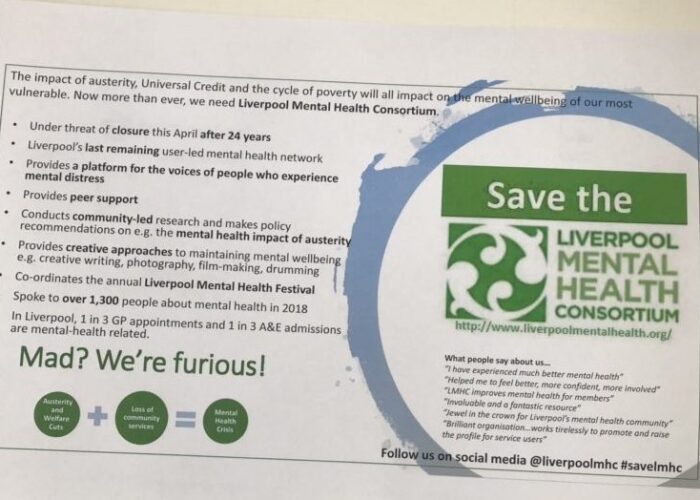
It is looking increasingly likely that Liverpool Mental Health Consortium will close due to cuts to its funding, according to campaigners fighting for its survival.
The charity was set up in 1995 by those who had lived with and experienced mental illness as a place to be listened to and understood by people who designed, paid for and delivered mental health care, and who wanted a say in how those services responded to their needs.
Since its opening, the LMHC has become a beacon for challenging the orthodoxy of service providers and represents an environment where anybody from any race, creed or colour can come together.
However, due to lack of funding, the future of the charity is looking bleak.
Joe Blott, trustee at LMHC told JMU Journalism that the charity will lose funding on March 31st so closure is imminent.
He said: “LMHC provides unique services in the city which will be lost forever. User-led services are vital for self determination and development, otherwise we are left with professional, clinical-led intervention which is costly and not suitable for all.
“Put simply, we need £120k pa. I think the council and CCG could provide funding. Whilst I accept their budgets have been greatly reduced by government, reducing preventative services inevitably leads to higher cost interventions in years to come.”
The charity has gained fantastic support from those who have either been affected by its work or believe in its importance.
Twitter: Pooja Saini
Such a great service- still hoping it gets commissioned! The cost savings of this service must be so huge compared to the impact of costs it will have on the nhs if it gets stopped. Sometimes funding decisions really do not make sense #mentalhealthisimportant https://t.co/zPEYJvC5e7
— Pooja Saini (She/Her) (@poojaliverpool) March 9, 2019
Veenu Gupta told JMU Journalism: “It’s so important to support user-led organisations that empower those with lived experience to have a voice.
“Research looking at the benefits of user-led organisations is key in adding to the evidence base.”
Liverpool City Council and NHS Liverpool Clinical Commissioning Group explained they were both required to make budget cuts and charities such as this were just unavoidable casualties.
A council spokesperson told JMU Journalism: “Liverpool City Council has not provided any funding to Liverpool Mental Health Consortium since 2012.
“This was due to significant financial pressures following cuts from central government, which led us to make some difficult decisions and prioritise funding for front line services.”
A spokesperson for NHS Liverpool Clinical Commissioning Group (CCG) told JMU Journalism: “In 2017, NHS Liverpool CCG needed to make significant savings to its budget, which unfortunately meant we could not continue to fund all of the voluntary and community organisations services we had in the past.
“While we recognise the valuable contribution that Liverpool Mental Health Consortium has made in the city, we believe we must focus our spending on direct patient care.”
YouTube: JMU Journalism (2017)

